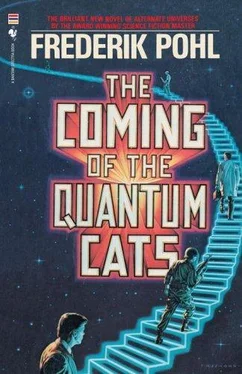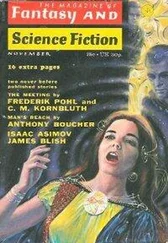Frederik Pohl - The Coming of the Quantum Cats
Здесь есть возможность читать онлайн «Frederik Pohl - The Coming of the Quantum Cats» весь текст электронной книги совершенно бесплатно (целиком полную версию без сокращений). В некоторых случаях можно слушать аудио, скачать через торрент в формате fb2 и присутствует краткое содержание. Год выпуска: 1986, ISBN: 1986, Издательство: Bantam Books, Жанр: Фантастика и фэнтези, на английском языке. Описание произведения, (предисловие) а так же отзывы посетителей доступны на портале библиотеки ЛибКат.
- Название:The Coming of the Quantum Cats
- Автор:
- Издательство:Bantam Books
- Жанр:
- Год:1986
- ISBN:9780553763393
- Рейтинг книги:5 / 5. Голосов: 1
-
Избранное:Добавить в избранное
- Отзывы:
-
Ваша оценка:
- 100
- 1
- 2
- 3
- 4
- 5
The Coming of the Quantum Cats: краткое содержание, описание и аннотация
Предлагаем к чтению аннотацию, описание, краткое содержание или предисловие (зависит от того, что написал сам автор книги «The Coming of the Quantum Cats»). Если вы не нашли необходимую информацию о книге — напишите в комментариях, мы постараемся отыскать её.
The Coming of the Quantum Cats — читать онлайн бесплатно полную книгу (весь текст) целиком
Ниже представлен текст книги, разбитый по страницам. Система сохранения места последней прочитанной страницы, позволяет с удобством читать онлайн бесплатно книгу «The Coming of the Quantum Cats», без необходимости каждый раз заново искать на чём Вы остановились. Поставьте закладку, и сможете в любой момент перейти на страницу, на которой закончили чтение.
Интервал:
Закладка:
I had been in Building A-440 before. It was what we called the Cathouse. The King of the Cats was a Regular Army colonel named Martineau. We'd been fairly friendly, at one set of hearings or another, and I was a little surprised he hadn't phoned me himself. It would have been a reasonably casual and informal thing to do.
As I got out, three MP's stepped out of the personnel carrier and followed me in. I began to perceive that there was nothing casual or informal about this visit. The MP's did not march in step, and they made no attempt to surround me, much less to touch me. But they never took their eyes off me, all the way in the door and through the halls to the office of Colonel Jacob Martineau. "Colonel," I said, nodding to him.
He nodded back. "Senator," he acknowledged, and then, "May I see your papers, please?"
No, not in the least informal. Martineau went over my Illinois driver's license, my senatorial courtesy pass, and the red-tagged plastic with my fingerprints and magnetic coding on it that the War Department gives to certain nuisances like myself, who have no military rank but do have the right, sometimes, to visit classified military installations.
He didn't stop with reading the spots off each and every one of them. He put the WD card in one of those little desktop terminals they use in fancy restaurants when you want to put a two-hundred-dollar dinner check on your American Express card, and when that had checked out he still wasn't satisfied. "Senator," he said, "I'd like you to tell me where we met last. Was it at the Pentagon or here?"
I said levelly, "As you well know, Jacob, it wasn't either one. It was in Boca Raton, at the conference on speculative technology. We were both observers."
He grinned. Relaxing slightly, he pushed my wallet back to me. "You're you, I guess, Dom," he said. "The other fellow didn't remember Boca Raton."
I started to ask a question about this "other fellow," but the colonel was ahead of me. "Hold on a second, please. Sergeant! Have the prisoner brought up to the interview room, please. The senator and I will talk to him now."
He watched the sergeant leave the room before he said, "We've got troubles here, Dominic."
"Because of this fellow who says he's me?"
"He doesn't exactly say that," said the colonel, frowning. "The trouble is, he doesn't say much of anything. At first we thought he was you. Now—"
"Now you don't any more?"
The colonel hesitated. "Now," he said, "I hate to tell you what I do think, but there isn't any other good way to explain it. Senator, I think this other man is a Cat."
A farmer named Wayne Sochsteiffer woke up to the sound of the early news report on radio station WGN, yawned, stretched, plodded over to the window, wondering whether he would have to put water on the beans in the north forty. When he got to the window he yelped in surprise. The north forty wasn't there. What was there was a chain-link fence, a parking lot that looked as though it would hold a thousand cars, and a long, low building that bore the sign: NISSAN MOTORS—YOUR BEST IN QUALITY.
This Wayne Sochsteiffer was mightily surprised.
This Wayne Sochsteiffer was not nearly so surprised as a farmer named Wayne Sochsteiffer who woke up in the same way, looked out the same window, and saw only what he expected to see: his north forty, olive-green in the early morning light. His farm was there. His surprise came when he turned back to the double bed and saw, peering out at him sleepily from her side of the covers, a quite different wife.
22 August 1983
4:20 A.M. Senator Dominic DeSota
The Cathouse personnel didn't seem to notice that it was the middle of the night. The prisoner had, though. He had been sound asleep. The sergeant phoned from the detention section to say that the prisoner begged permission to void his bladder and take a shower before he came up to be interviewed. "Why not?" I said, when Colonel Martineau asked me. "I don't mind being a little considerate. Especially to me."
He opened his lips and laughed silently. It was the kind of laugh you give an incongruity, not a joke. He gave the permission and ordered up coffee, as much for ourselves as for the prisoner, and then we sat looking at each other while we waited.
There didn't seem to be much to say.
We could have chatted about this person who seemed to be me, but both of us had formed the habit of not chatting about Cats. In fact, we never even used the term except in the confines of a classified meeting. As far as I knew, the term had never appeared in writing anywhere. It was the biggest secret in America's most secret defense research facility. It was such a big secret that I hadn't for one minute believed it was true.
Sandia wasn't all secret. There was the solar-power research facility, and that wasn't secret at all; it took up more than half the thousands of sprawling acres of the base. The nuclear-weapons section wasn't exactly a secret, either-only what was going on in it was secret. The world knew that there was a flow of smart bombs and self-piloting missiles coming out of that part.
After that no one knew. Or at least, no one was supposed to know, that there were parts of Sandia a lot weirder than any of that. There was one small section devoted to climate modification as a way of cutting off an enemy's agriculture, and another exploring the possibility of genetic warfare. Genetic. The goodies they were whipping up weren't viruses or chemicals to attack the present population of a foe state. They were DNA spoilers. They were meant to make the enemy's children grow up incompetent and defeatable.
I defend myself by saying that, although this seemed immoral to me, it also seemed as though it wouldn't ever work anyway.
Then there was Psi-War. Even more doubtful, even more peculiar. Inside the Psi-War building we kept a herd that averaged eighteen or twenty wackos and loopies—as young as eight years old, as old as eighty—all very odd indeed. Each one of them claimed some special ability. There were the guys with the "out-of-body" skills; they said they could leave their own bodies and enter another's, even another's thousands of miles away, and see with the other person's eyes and hear with the other person's ears. Wonderful! They could go to an enemy base and sniff out every secret there was! Some of them said they had actually done that, although we had yet to find a secret that could be made to work for us, or that any other evidence suggested was working for anyone else.
Of this whole shebang I was a big, big skeptic. Part of the reason was simple cynicism. The loopies were so loopy, and besides they had a nasty little habit of cheating on the tests. Once caught cheating they were on probation; twice caught, they were out. Sooner or later, they were all out. This didn't deter the people who ran Psi-War very much, though. As soon as they decided one weirdo was a fake and sent him on his way, the talent scouts turned up another in some tanktown in Idaho or Alabama and shot him over to us to be checked out . . . and so on, and on.
The other reason I was a skeptic was not cynical at all. On the contrary. It was the opposite of cynicism; my fellow committee members charged me with almost idealism when I hinted at it.
I didn't believe we really had any enemies.
Oh, the Japanese and the Germans, sure. They were really tough competitors and our business community hated them as much as old Cato had hated Carthage. They really lambasted us in international trade; but did we want to go to war with them? By "enemies" I mean irreconcilable blood foes, like Adolf Hitler or Josef Stalin had been a while back. They were long gone-in fact, there was a grandson of Stalin's in the Russian diplomatic corps that I played poker with when I got a chance. Nice guy. Such mortal, military enemies simply did not exist. That wasn't so much wisdom and tolerance on our part as it was luck, of course-if the Cold War had got a few degrees hotter some years back, it could have been pretty bad. But we were saved all of that when the Russians and the Chinese escalated their border arguments into a full-scale nuclear confrontation. They stopped after a few bombs, but neither of them was a really worrisome military enemy any more. Their big problem was trying to keep from falling apart entirely.
Читать дальшеИнтервал:
Закладка:
Похожие книги на «The Coming of the Quantum Cats»
Представляем Вашему вниманию похожие книги на «The Coming of the Quantum Cats» списком для выбора. Мы отобрали схожую по названию и смыслу литературу в надежде предоставить читателям больше вариантов отыскать новые, интересные, ещё непрочитанные произведения.
Обсуждение, отзывы о книге «The Coming of the Quantum Cats» и просто собственные мнения читателей. Оставьте ваши комментарии, напишите, что Вы думаете о произведении, его смысле или главных героях. Укажите что конкретно понравилось, а что нет, и почему Вы так считаете.












